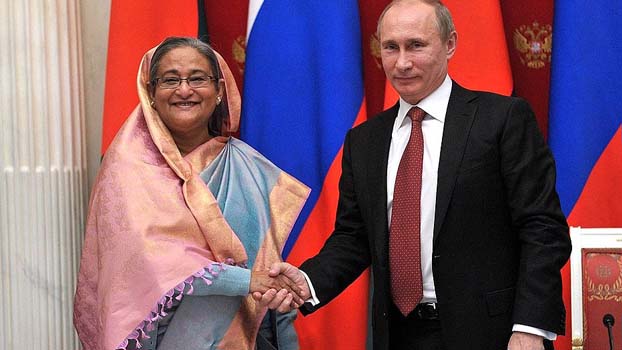Fostering economic cooperation with Russia

History repeats itself, time and time again. Once again, our old friend Russia has shown us their sincerity in building a lasting friendship with Bangladesh. At the end of May of this year, a memorandum of cooperation (MoC) between the Eurasian Economic Commission (EEC) and the government of Bangladesh was signed in Moscow.
The signing of the MoC will enable Bangladesh to get greater trade benefits in 18 sectors. The EEC comprises of five member-countries - Armenia, Belarus, Kazakhstan, Kyrgyzstan and Russia. The multi-lateral deal will include trade facilities, economic growth and analysis of macroeconomics, strategic policy, customs policy and process, cooperation for removing barriers to export of vegetables, financial market, communication, energy policy and agriculture industry competitive policy.
Back in 1971, the USSR was a staunch supporter of the people of Bangladesh during our struggle for independence and one of the first nations to recognize us as a sovereign state. We will always be indebted to the Soviet Union for their position in the United Nations Organization during the discussions of the conflict between India and Pakistan. The country vetoed the UN Security Council’s resolutions, countering the United States in saying that the conflict was an internal matter of Pakistan.
The USSR further supported Indian actions during our liberation war. After the war, the Soviet Navy sent a floating workshop to Bangladesh for clearing Pakistani mines from the Chittagong and Chalna harbours.
The operation of minesweeping and raising sunk ships was concluded in 26 months. During the operation, a senior sailor Yuri V. Redkin lost his life. His grave is situated on the premises of Bangladesh Military Navy Academy. The valiance of Soviet sailors saved countless lives after the war, foiling insidious the plans of the Pakistani army. We truly owe them our sincerest gratitude.
After independence, the newly formed Bangladesh Air Force received a significant donation from the Soviet Union, including ten single-seat Mikoyan-Gurevich MiG-21MFs and two twin-seat Mikoyan-Gurevich MiG-21Ums aircrafts.
The establishment of diplomatic relations between the USSR and Bangladesh took place on the 25th of January, 1952. After the dissolution of the USSR, Bangladesh continued these relations with the recognition of Russia as the successor state to the Soviet Union. In March of that year, Bangladeshi Prime Minister Sheikh Mujibur Rahman visited Moscow, in part to thank the Soviet state for their support for Bangladeshi liberation movement in 1971.
However, after the 1975 coup in Bangladesh during which Bangabandhu Sheikh Mujibur Rahman was assassinated, relations with the Soviet Union rapidly deteriorated. During the subsequent hostile regimes, Bangladesh deemphasized socialist policies and opted for closer ties with the United States, Arab states, Pakistan, and the People's Republic of China. The establishment of ties with these countries further alienated us from the USSR, as the above mentioned nations were politically distant from the Soviet Union.
Thus, the country entered an era where we did not have support of the very friends who had been with us since the very inception of Bangladesh. Fortunately, the bridges which were burned were mended in the following years and the two countries have come a long way in building cooperation and diplomatic relations.
Of particular significance is the new MoC signed between the countries this year. The MoC entails investment in intellectual properties, industries and service sector, consumers' right protection, initiator development, technology, public procurement, manpower import and other financial sectors.
This is an amazing opportunity for our country as we strengthen our efforts to become a middle income nation by 2021. Our agriculture sector will be the most benefitted along with our export sector. Russia is one of the world’s largest economies as well as one of the highest in GDP rank. To be able to collaborate with them will give our economy a huge boost and propel our national GDP to new heights. The deal will also bring in huge amounts of foreign investment for our country.
One of the most important mega projects undertaken by the government is the currently under construction Rooppur nuclear power plant which is being built by Russian Rosatom State Atomic Energy Corporation. The project is 90% funded by a loan from the Russian government. On top of that, Rosatom will operate the units for the first year before handing it over to Bangladeshi operators. Russia will also supply the nuclear fuel and take back spent nuclear fuel. Needless to say, this huge income-generating and sustainable energy source for our country would not be possible without the unending support and cooperation from Russia.
Last week, Border Guard Bangladesh (BGB) and Russian Helicopters signed an agreement for providing Bangladesh frontier force’s members with specialized training on operating and maintaining helicopters. As part of the agreement, the Russian company would provide training to BGB pilots, flight engineers and technical staff at Ulan-Ude, Russia and here in Bangladesh as well.
The cooperation with Russia in the field of education has been key to the development of our country’s human resources. Countless doctors, engineers, and other important professionals have graduated from Russian institutions of higher education since the 1970s till today. Since 1995, the Russian Education and Science Ministry has been providing scholarships for Bangladeshi students to encourage our students in STEM degrees. The assistance of the Russian government to Bangladesh in the field of education has transformed the lives of thousands of students.
Bangladesh is extremely fortunate to have one of the world powers such as Russia helping us in so many sectors, from energy generation to our armed forces. What must be kept in mind is that Russia also stands to benefit from their continued investment and support to our country. Bangladesh has achieved remarkable success in the development sector. Thanks to the aid of the Russian government, Bangladesh might soon become a key player among the Asian economies. Perhaps someday Russia will consider itself fortunate to have such strong ties with our country.
Synthia Kainath Nur is a member of the Editorial Team of Bangladesh Post.




